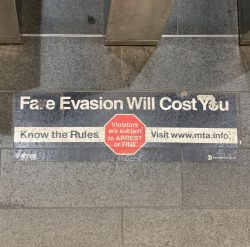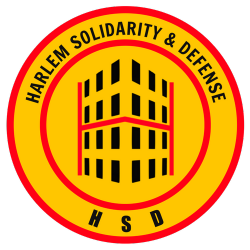Staff Writer Aditi Misra interviews students, campus organizations and local activist groups on the recent MTA fare evasion policy.
This past June, Gov. Andrew Cuomo and the MTA announced the addition of 500 police officers to the New York City Transit system in order to prevent fare evasion. This policy has resulted in widespread criticism, especially due to the violent arrest of Adrian Napier, an unarmed black 19-year old.
Hundreds took action in Brooklyn on November 1 and in Harlem on November 22 to protest the crackdown and continue to denounce the NYPD’s efforts, including members of the Barnard Prison Abolition Collective. Vice President Anna Sugrue (BC’20) sees the increased enforcement as part of a broader system that seeks to perpetuate injustice. “Police in the subway system and the criminalization of people jumping the turnstile is a bigger problem of hate towards poor people, implemented instead of dealing with systemic poverty and with the problems that cause it,” she said.
NYPD estimated a loss of $225 million as a result of fare evasion. But Citizens Budget Commission, a nonprofit pursuing change in the city’s finances, has argued that the addition of 500 officers to subway stations actually costs more than the fares saved. As an alternative proposal, Sugrue and BPAC advocate for the creation of “subsidized fare systems, similar to a few other cities around the world, and free or subsidized fare for those under 18.”
///
In a poll conducted among Bwog’s Instagram user base asking if they had ever hopped a turnstile or used an emergency door to evade the fare, around 50% of respondents said yes. Some said that they didn’t hop the turnstile intentionally, but they would walk through an emergency door if someone held it open. One respondent pointed out that “the NYC subway IS expensive.” Several respondents added that they evaded the fare when they were out of money, and others wrote, verbatim, “Fuck the MTA.”
Apart from being unable to afford the $2.75, people may find themselves evading the fare while in a rush. This was the case with one Columbia student, who received a $100 ticket from an undercover cop at the 86 Street station. After realizing there was only a dollar left on their MetroCard, the student hurriedly walked through the open emergency door along with three others. While waiting for the subway, a man dressed ordinarily who had been standing by the platform flashed his badge and wrote them a ticket.
“After taking our IDs, the officer asked us why we did that. I just apologized, said I was in a hurry and didn’t have enough money on my card. The officer was lecturing us but at the same time was like ‘Sorry, I have to do this.’” The student said this is just a civil charge, similar to a parking ticket, but it will turn into a criminal charge if the ticket is not paid off within a month.
The student also believes that the bolstering of law enforcement is essentially pointing fingers at the wrong problem. “I would almost compare it to blaming plastic straws for the climate crisis. I don’t think fare evasion is why the system is crumbling,” the student said. “I think we need to reevaluate how we are making decisions on this big piece of infrastructure that we deal with on a daily basis, instead of saying it’s crumbling because of these people who are evading fare. The people dealing with these funds [from the $2.75] don’t know how to allocate their budget in a way to serve this city and the people who rely on this mode of transportation every day.”
Another group of Barnard students had a different experience with undercover cops at the 110-Cathedral Parkway station. Running late on their way to Brooklyn, one student swiped in another while a third jumped the turnstile. They soon noticed plainly dressed men looking at them in an “unsettling way.” The men flashed their badges and asked, “Do you know why we’re stopping you?”
“I full-on said, ‘Because I swiped my friend in,’ because obviously nothing bad was going to happen to us as white women. We weren’t really stressed out,” one of the students explained.
After writing a $100 ticket and walking them through the procedure, the police officers looked at each other and turned off their cameras.
“One of the officers said to us, ‘Now that the formalities are out of the way, here’s how you can get out of this.’ It was really unsettling because you have the capacity to be kind. Clearly you’re selective in the way that you’re doing this. And because we’re well-dressed, unassuming white girls you feel like you have the liberty to treat us a certain way,” she explained. “They told us, ‘Here’s the narrative you have to craft: tell them you just moved to the city, you watched other people jump the turnstile and you couldn’t swipe through. You were in a rush.’ They literally told us, ‘You should absolutely be able to get out of this or at least get a $25 fine.’”
This wasn’t the first time this student had jumped the turnstile. She cited convenience as her number one reason in doing so, but added that she “stopped consistently jumping the turnstiles after the protests and videos came out showing the police violence because I felt deeply uncomfortable exercising my privilege in that way.”
When asked about alternative methods to improving the transit system, the student mentioned the organization behind the mass protest in Brooklyn this past November.
“I’m a huge fan of Decolonize This Place. They’re petitioning to abolish the fine completely or at least significantly lower it. If the whole point of public transit is accessibility, why are we inhibiting that?”
- Fare evasion deterrent at 34th Street station.
///
As mentioned above, several activist groups and organizations throughout New York have spoken out and acted against the MTA’s crackdown. One such act of protest came from an anonymous group of New Yorkers, who posted unauthorized advertising seen throughout several subways, pointing out the legal right of riders to “swipe it forward.”
I’m so proud of the mysterious fellow New Yorkers who put these ads up. As the MTA & NYPD continue to police poor communities of color, these guerrilla ads are a good reminder that folks are trying to address this systemic racism💪🏼 pic.twitter.com/ULle4NK1gs
— 𝕋𝕙𝕖𝕪’𝕣𝕖 𝕒 𝕡𝕣𝕖𝕥𝕥𝕪 𝕓𝕠𝕪 (@prettyboy_zhao) September 18, 2019
In an interview with Gothamist, one organizer involved in the advertising stated: “This is just broken windows policing in an effort to continue to incarcerate our community. It’s clear that so many people are sick and tired of policing of poor black and brown folks who just want to access public transportation.” Indeed, many community advocates emphasize how, to attempt to address the problem of mismanagement of budgets by local and state officials, the MTA in fact unfairly punishes people of color and low-income residents.
Another activist organization, Harlem Solidarity and Defense, works closely with Decolonize This Place in “fighting for a future that serves the majority of the New Yorkers and communities built by working-class black and brown communities.” Regarding the recent fare crackdowns throughout New York, including in the Columbia community, a representative from the organization pointed out how the MTA’s actions prove part of a larger pattern of racist, classist police discrimination.
-
Harlem Solidarity & Defense
IG @harlemsolidaritydefense
TW @harlem_sd
FB @harlemsolidaritydefense
As one representative said, “The police enact violence on us for organizing our community, for making money when there are no jobs, for organizing against our employers and generally, just for being poor and black. So when we look at the recent violence of the MTA transit cops, we face it with familiarity.”
In context of these deep-seated issues with policing, Harlem Solidarity and Defense now sees the MTA as wielding police forces to sustain its control over the transportation sector, despite a number of other actions available for the MTA to take. “Instead of complying with a lower-priced fare or allowing vendors to sell, the MTA chooses violence,” the organization said.
However, Harlem Solidarity and Defense urges New Yorkers, including students and MTA workers themselves, to organize against the MTA’s fare evasion crackdown and make their voice heard. “The MTA and the NYPD are massively organized entities, so in order to reject their violence, we have no choice but to be organized,” a representative said. “We call on MTA workers to take up solidarity with their fellow New Yorkers and stand up to the NYPD by refusing to stand by these draconian policies and organize against their corrupt bosses for better conditions and treatment.”
///
Supporters of the policy continue to reiterate the policy’s objective of improving safety in the transit system. However, those in opposition continue to emphasize the greater benefits that would result from officials diverting their focus from fare evaders to the improvement of the system’s function and the increase of its accessibility for all New Yorkers, especially as the crackdown of fare evasion disproportionately affects both people of color and low-income populations.
Given the differences in the treatment of violators of the policy, concerns persist over what measures officers will take to avoid profiling. Bwog reached out to the NYPD for this story but did not receive a response.
Images via Bwogstaff


 0 Comments
0 Comments

